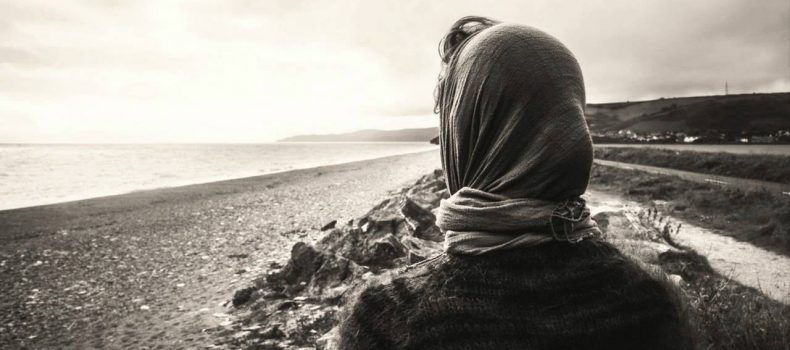Reclaiming Sephardic music, culture on road to Spanish citizenship
When Maya and Noa Dori were kids growing up in Israel, they used to spend Shabbat with their grandmother Lisa Romano. One night, as Maya tells it, they walked outside and “started to pinpoint the stars.” Their grandmother quickly swatted Noa’s hand, furious.
“She said, ‘It’s forbidden,’ ” Maya remembered during a recent phone call from Spain.
When Maya and Noa asked why, their grandmother told them, simply, that horrible things would happen to their fingers if they counted the stars. For years, the mystery behind this star-crossed obsession vexed the sisters.
As they grew up, Maya and Noa became more and more interested in their grandmother’s Sephardic heritage, until finally, a decade ago, Maya decided to try reclaiming her Spanish citizenship. As part of her research, the answer to the star-counting mystery finally revealed itself.
During the time of the Inquisition in Spain, Maya explained, “They were hunting people that said they converted to Christianity, but at home preserved their Jewish customs and heritage. [The Inquisition authorities] stood at the corner of the street, [on] Shabbat, waiting for those trying to pinpoint three stars.”
Those who were caught “were instantly recognized as Jews, and the Spanish would do terrible things to them,” she continued. The fear of counting the Sabbath stars was then passed down through the generations, all the way to Maya and Noa’s grandmother.
When Maya went before the Spanish authorities to reclaim her citizenship, she told them the story of her grandmother and the stars. Now, Maya and Noa are hoping to help other Jews of Spanish descent reclaim their birthright by applying for Spanish citizenship. To do so, they’ve founded an organization, Lisa Advisors, named after their grandmother.
They’re holding a special evening of music and learning at the Roxbury Park Community Center in Beverly Hills on Jan. 29 at 6:30 p.m., hoping the Los Angeles Sephardic community will turn out to hear about their stories and to listen to some wonderful music.
“Two years ago, the Spanish government announced a big project about giving Spanish citizenship to Sephardic Jews,” Maya said. “A lot of people don’t know that they have a lot of things inside of their memory, inside of their family culture and history, that can be used as proof.”
Regaining Spanish citizenship is a different process than the process to regain German citizenship lost during the Holocaust. Because no one really has papers from the 1400s — when Jews were expelled from Spain — modern-day Spanish authorities rely upon a mix of information in making their decisions. Everything from family names, to Sephardic ketubahs, to knowledge of Ladino can be used as “proof” of Spanish ancestry.
The proposal announced in 2012 would ease some of the current restrictions to seeking citizenship: residency in Spain will no longer be required, and dual citizenship will be permitted. In June 2014, Spain’s Council of Ministers approved the draft law. It is expected to pass in Parliament later this year, Maya said.
Once passed, “[The] law is only available for two years,” Noa stressed. “So you can imagine what kind of a mission we are on.”
When Maya began the process for herself 10 years ago, almost no one knew the process, she said.
“The clerks here in Barcelona were looking at me in a puzzled way, and called their manager because they didn’t know what to do with me,” she said.
Maya’s story was entered into evidence, along with a family Sephardic ketubah and some other items.
“It was part of my case, and they sent it to Madrid,” she said. Soon after, the Spanish authorities granted her request and gave her citizenship.
Noa, who lives in Los Angeles, has been acting and singing since she was a child, first in Israel and later in the United States. She’s appeared on TV shows such as “Castle” and “Days of our Lives,” and performed duets with the likes of Adam Lambert. But even today, she recalls that her grandmother always wanted her to sing Ladino music more than anything.
“My grandma used to ask me why I was yelling,” Noa said by phone, of her grandmother’s reaction to the opera songs she would sing as a teenager. “She’d say, ‘Sing Morenica,’ ” referring to a popular Sephardic song. Although Noa went on to sing with the Israel Philharmonic Orchestra and at the Bolshoi Theatre in Moscow, she never forgot her grandmother’s words.
While Maya handles the academic and legal aspects of Spanish immigration — something that comes naturally to her as she’s a lawyer and has a doctorate in economics — her sister takes care of the cultural side.
“I’m not a lawyer,” Noa said. “I’m a singer and a performer, so really this evening is about bringing the Sephardic Jewish community together, not just for the information purposes of if they wish to get European citizenship … but also to reminisce and to celebrate the Ladino music that I’ll be responsible for.”
As someone who’s already gone through the process, Maya knows that she can help those seeking to reclaim their own heritage.
“I want them to really understand that we are one big family,” she said. “In Israel for many, many years … being Sephardic was not something people used to be proud of.”
Living in modern-day Spain, Maya knows that she can make a difference.
“The Jewish community here is very small, and it would be nice to see more and more people coming,” she said. “We were important. We’re still important.”

